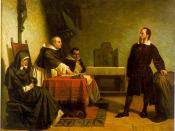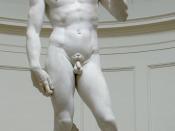The Renaissance was a major turning point in western intellectual and cultural tradition. Many of these changes were centered on the idea of humanism. Humanism is philosophy largely focusing on human interests. During this time period people started to become less "God centered" and more "human centered." Such changes can be chiefly seen in art, writing, and science (as well as adverse political effects).
The writing of the Renaissance can be seen evolving due to the simple fact that now everyone from kings to peasants wanted to be wise and to speak eloquently. The idea of useful education for the people, and very "well rounded" schooling in many different fields of learning were the new defined goals of Renaissance education. People all over (especially in Florence) brought the ancient Greek works of Plato, Aristotle and many others back to life and into Italian. They rediscovered and studied the philosophies of these great scholars and redeveloped the "scientific theory" in which you didn't just accept whatever was told to you, but you tested the truth of it.
This effected writing in the Renaissance tremendously. Now, writers were more well-read to begin with and could base their works on the masterworks and classics that were lost for so long.
The Turkish-Moslem capture of Constantinople, the Eastern Capital of the Roman Empire, in 1453, further stimulated Italian humanistic scholarship by forcing Greek scholars to come west to Italy. They often brought ancient manuscripts with them. The invention and further development of printing after 1451 also opened up new academic opportunities and spread the new knowledge, critiques, and debates.
One very important part of this expansion of written knowledge is the idea that man, not God, sets the standard by which to judge things. The humanists' revival of humanistic studies -- rhetoric, literature,


